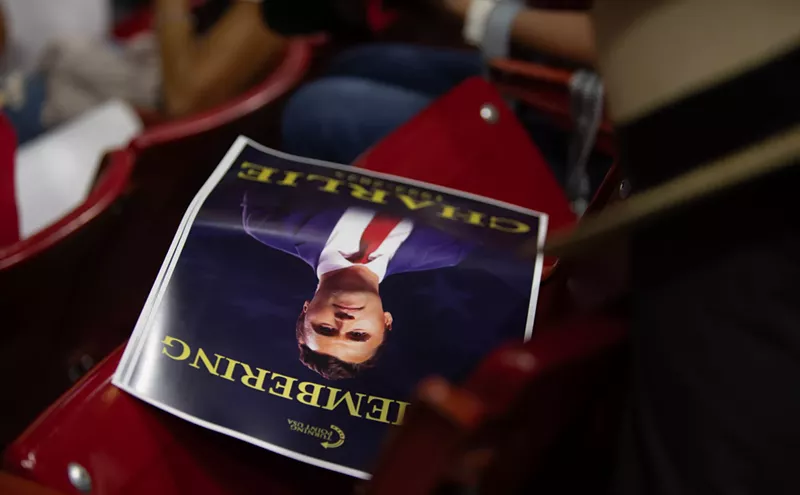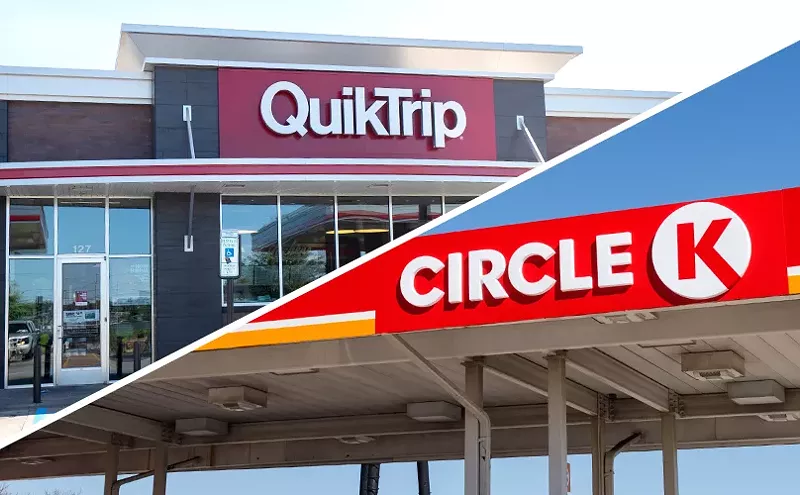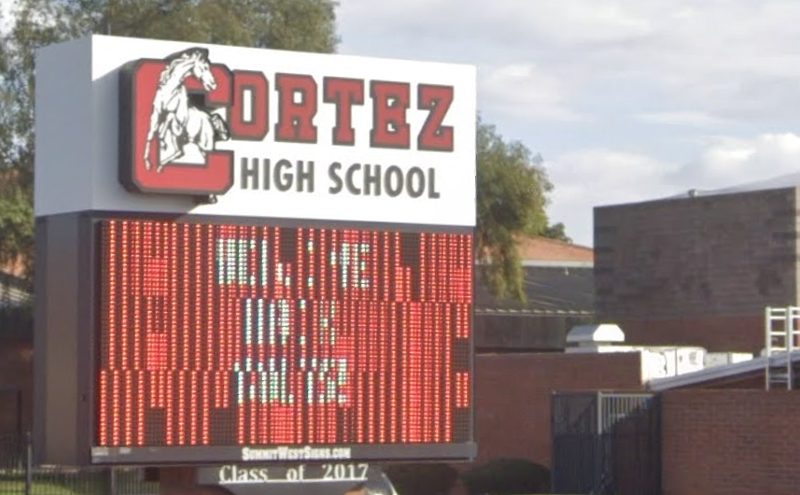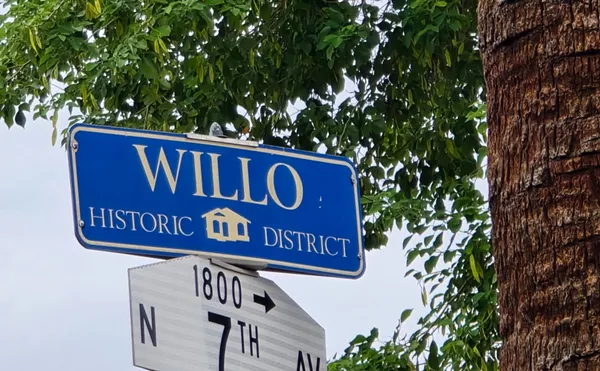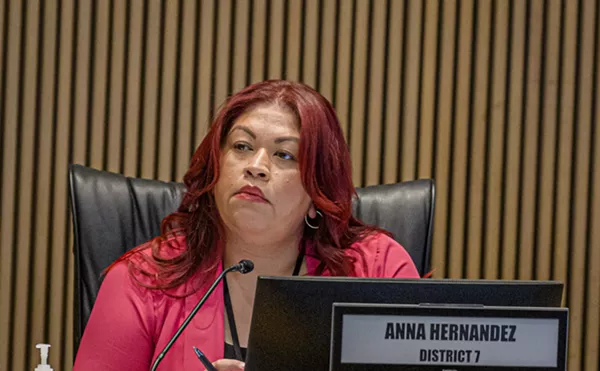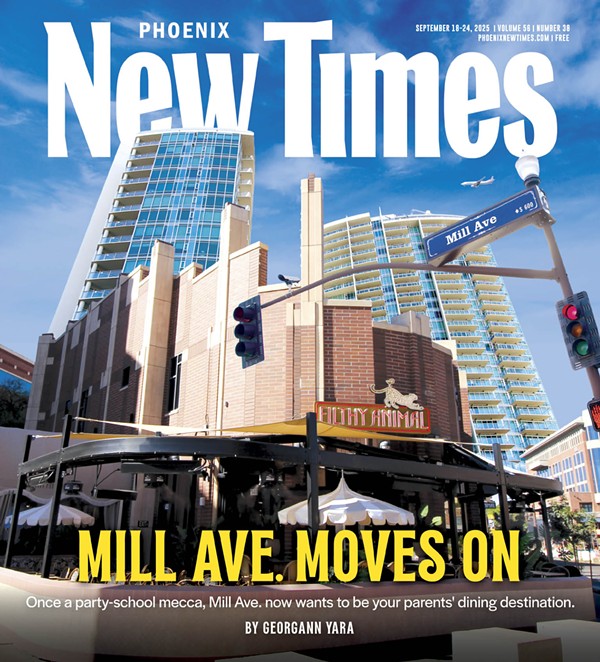And it happened in Houston.
But it didn't happen in Phoenix.
The eagerly anticipated Randy Johnson Effect never materialized at Bank One Ballpark.
Yes, Johnson racked up the third most strikeouts in single-season history this year en route to winning 21 games in the regular season and three so far in the postseason, including his stellar shutout of the New York Yankees in Game 2 of the World Series.
But strikeouts and wins were expected.
The phenomenon Diamondbacks managing partner Jerry Colangelo hoped to see when he signed Johnson to a $52.4 million contract in late 1998 was a sharp increase in attendance every time the legendary lefthander took the mound.
That's what happened when Johnson pitched for the Seattle Mariners and the Houston Astros. And that's what Colangelo expected would occur in Phoenix.
Colangelo was wrong.
"The Randy Johnson phenomena in Seattle and Houston never happened. It just didn't translate here," Colangelo says.
"So, here I am learning on the job, so to speak."
Colangelo's miscalculation of the financial impact of Randy Johnson wouldn't be so bad if the mistake was simply isolated to one player.
Unfortunately for the Diamondbacks, Arizona fans have proved to be a far tougher sell than anticipated. World Series ticket fever aside, interest in the Diamondbacks has steadily declined during the team's first four years. Attendance this year fell to 2.7 million, down from 3.6 million in 1998 when the team lost 97 games.
Arizona's anemic fan support stunned the Diamondbacks' top brass, which counted heavily on huge crowds packing the house to feed the bulging salaries of stars such as Johnson, Curt Schilling, Matt Williams, Steve Finley, Reggie Sanders, Jay Bell and Luis Gonzalez.
The Diamondbacks' management, however, badly misread the Phoenix market. They equated fielding a high-paid, winning team with generating a fat bankroll.
Their financial plan backfired long ago. And there is little Colangelo can do about it now.
Even if the Diamondbacks win the World Series, the team is in such a deep hole it will take years to dig out.
Already, Colangelo is working on yet another business plan -- it will be at least the third since the team's inception.
The first was a go-slow approach focusing on young, lower-paid players, and it actually turned a profit. But tellingly, the conservative approach was dumped after one year for a win now, pay later game plan. The team won. But losses soared. And attendance lagged.
The 61-year-old Colangelo won't say what his new strategy entails, other than it spans 10 years and it must solve a huge problem.
"I don't think there is ever going to be a cash-flow solution that we are going to draw so many people and average such a high ticket price that it is going to allow you to reduce all your debt, pay all your bills and have a competitive team and live lovingly ever after," he says.
"That will never happen."
Then what is the ultimate solution?
"There needs to be an adjustment in the economic structure of baseball first," Colangelo says. "Obviously, if there were salary caps and there was an even playing field, I like my chances against anyone."
Imposing salary caps won't be easy. The powerful Major League Baseball Players Association is steadfast against salary caps, setting the stage for a possible long and very bitter lockout when the players' agreement with owners expires at the conclusion of the World Series.
Going head-to-head with the players over salary caps is a high-risk strategy for owners.
Fans will likely have little patience for another prolonged baseball work stoppage such as the one that led to the cancellation of the 1994 World Series. Yet without some sort of rein on runaway salaries, big-market teams like the New York Yankees will continue to have a huge economic advantage over small-market expansion teams like Arizona.
The Yankees were purchased by a partnership headed by George Steinbrenner for $10 million in 1973. The team owes no money on Yankee Stadium, which was built in 1923 and renovated in 1975. The Yankees' payroll this season topped $114 million.
Conversely, the Diamondbacks paid a $130 million expansion fee to Major League Baseball and were forced to forgo $25 million in national television revenue during their first five years. The team also is saddled with a $127 million debt stemming from cost overruns to build the ballpark, which the team operates at a cost of $10 million a year. Diamondbacks salaries this season totaled $71.5 million, although players deferred $30 million for future years.
"Look at the disparity between these two World Series teams," Colangelo says. "Twenty million people versus 3.3 million in market size. A team that gets close to $100 million a year in local television and cable versus our $18 million. Ticket pricing that is enormously disparate. It's apples and oranges."
Colangelo concluded there was only one option that would allow his team a shot at an elusive World Series ring, while still protecting a $350 million investment in the team.
Debt. Lots and lots of debt.
At some point the Diamondbacks will face a day of reckoning.
It could get ugly.
"They are going to have an absolute disaster," says Clark Griffith, a former baseball executive with the Minnesota Twins who is now a business attorney. "They are going to have to shed salaries."
While Colangelo has been masterful in putting a great team on the field, the team's financial structure is far less impressive.
Hailed widely as one of sport's most savvy owners, Colangelo deflects questions about the team's finances with a "trust me" approach.
"I keep telling people I'll worry about the finances. Everything will be fine," he says.
Colangelo's assurances aside, the fact of the matter is the Diamondbacks are saddled with massive debt and rising expenses in the face of anemic revenue growth and a nationwide recession.
That's as wicked a scenario in business as facing Johnson and Schilling is on the field.
Even with the Diamondbacks' early success in winning the first two games of the World Series, the team's long-term financial outlook remains grim.
So much so that prospective investors tell New Times Colangelo is trying to raise $160 million in new limited partnership shares. These potential investors could join other limited partners who have already put up nearly $200 million.
Colangelo declined to comment on the offering.
Several of Colangelo's current limited partners say they were not aware that Colangelo was seeking more investors until contacted by New Times. According to the team's 1995 limited partnership agreement, Colangelo can sell an unspecified amount of additional limited partnership shares beyond the original 29 shares that were sold.
John Finn, venture investment manager for El Dorado Investment Company, says El Dorado has had no discussions with Colangelo about additional partnership shares. El Dorado has about a $7 million stake in the Diamondbacks.
The addition of another $160 million in equity in the team would increase investment in the Diamondbacks to about $510 million, more than twice the $245 million value placed on the team this year by Forbes magazine.
Obviously, attracting new investors could be a tough sell for Colangelo. Particularly when operating losses are expected to continue indefinitely.
"Realistically, this thing is never, ever going to throw off positive cash in the foreseeable future," Colangelo says. "It just flat-out isn't going to happen."
Nevertheless, attracting new investors appears to be the team's only hope in reducing debt -- which requires regular payments.
Just as Colangelo misjudged the "Johnson Effect," he also grossly underestimated the cost of Bank One Ballpark. The team agreed to cover all costs of the stadium beyond the $238 million contributed by taxpayers. Colangelo anticipated the stadium would cost about $270 million. But a tight construction time line along with design and construction snafus drove up the price to about $370 million.
The Diamondbacks had to absorb the cost overruns. In 1998, the Phoenix Industrial Development Authority issued $127 million in bonds that the Diamondbacks are obligated to repay. The bonds consolidated much of the team's outstanding debt. The tax-free municipal bonds also save the team on interest on the $11 million annual payments.
The July 1998 IDA bond agreement required the team to publicly release annual financial reports, but the Diamondbacks stopped doing that after the 1999 season. The Phoenix Industrial Development Authority did not return calls seeking comment about the team's failure to disclose its finances.
The stadium was just the beginning of the red ink.
In Colangelo's zeal to field a winning team now, he has persuaded more than 10 of his players to defer more than $150 million in salaries -- at a reported 6.5 percent interest rate.
Even with the deferrals -- and a reported $20 million loan co-signed by Major League Baseball -- the Diamondbacks' operating losses are mounting. The team says it lost $65 million in the last three years, but no one outside the team's owners and bondholders have seen audited financial statements since 1999.
Colangelo hints that major changes could happen following the 2002 season, when many contracts with his players expire.
"Next year, we are still going for it," he says. "What I do beyond that is going to depend on a lot of things. It's going to depend on what kind of support we do get. How much of an increase are we going to have next year? What is going to take place?
"My job is to feel the pulse, [and] make the changes that need to be made."
Colangelo's pulse must have spiked in the fall of 1998 when he got word that season ticket renewals had plunged 25 percent after the team's first season.
Such a precipitous decline in season ticket sales was not anticipated in the team's five-year business plan. The Diamondbacks were hoping to emulate the Colorado Rockies, an expansion team that has achieved stunning attendance success since joining the National League in 1993. The Denver sports market is very similar to Phoenix -- both cities have four major sports franchises.
"Our plan going into our first season was take a four- or five-year run at building our franchise slowly, and the model more than anyone else was probably Colorado," Colangelo says.
"Colorado," he says, "was enjoying a honeymoon, so to speak, because people were so excited about getting major league baseball."
The Rockies' love fest had lasted five years by the time the Diamondbacks took the field for the first time in 1998. Denver drew more than four million fans in the 1998 season and the team played in a free stadium.
"So my goal, my objective, was let's go with young players, let's build a farm system, let's do it slowly and kind of model ourselves assuming we have that kind of support," he says.
In the Diamondbacks' first season, it appeared that fan support in Phoenix would track Colorado's. The Diamondbacks received more than 40,000 season ticket applications before the team's first game and sold an impressive 36,000 season tickets for its inaugural season.
"It was phenomenal," Colangelo says.
With season ticket sales leading the charge, the Diamondbacks drew more than 3.6 million fans their first year and generated $105 million in revenue. A modest $32.4 million payroll allowed the team to show a $21.1 million operating profit its first season.
So far, so good.
But then Colangelo made a crucial mistake at the end of the team's first regular season when he raised ticket prices during fan appreciation week.
The team had just completed its first season, finishing last in the National League Western Division, and was already raising prices 12 percent. The price hike came a year after an unpopular sales tax that generated $238 million for the ballpark construction had expired. The ticket price increase was widely perceived as greedy.
Season ticket renewals for the 1999 season plummeted.
Colangelo then made a crucial decision that has had a profound impact on the field and on the balance sheet.
Rather than adjust his business plan to the reality of lower attendance and try to work things out over time with modestly paid, homegrown players, Colangelo opted for expensive, big-name stars.
"The only conclusion I could come to was to protect the major investment that already has been made, we are going to have to compete sooner rather than later," he says. "That's when I embarked on trying to win now."
Colangelo abandoned his five-year business plan after only one year.
"I was concerned about a continual [attendance] erosion, and that was putting a major substantial investment in jeopardy," he says. "I have always maintained I have fiduciary responsibility to my partners. So I concluded that by becoming competitive, we could get some of that back. I really felt that way."
Colangelo pulled out the checkbook and signed a stable of big-name players prior to the 1999 season, more than doubling the team's payroll from the year before to $68.5 million. And that didn't include tens of millions of dollars in deferred salaries.
Colangelo's new strategy worked wonders -- at least on the field.
The team won 100 games and clinched the Western Division.
"We had the biggest turnaround in the history of major league baseball," Colangelo says.
But going from last place in 1998 to first place the next year and earning a trip to the playoffs failed to impress Arizona fans.
Attendance for the 1999 season fell to 3.2 million, an 11 percent decline from the first season.
Even worse, the team lost $15.8 million.
Colangelo's new business plan resulted in a $37 million erosion in net operating income in just one year. And now, he was locked in through 2002. It was too late to make any significant salary adjustments, because most of the players had been signed to four-year contracts.
Having won the division, the Diamondbacks hoped that season ticket sales would increase for the 2000 season. Instead, they fell slightly.
Once again, Colangelo's theory that a winning team packed with highly paid stars would increase attendance at Bank One Ballpark was being seriously challenged.
The 2000 season started off strong, but the team faded in the second half and finished well out of contention for the playoffs. Attendance slipped again, dipping to 2.9 million.
Now Colangelo was faced with the worst of both worlds -- a highly paid, poorly performing team and declining attendance. The team reportedly lost $24 million in 2000, according to reports in the Arizona Republic, which is one of the team's limited partners.
Colangelo fired manager Buck Showalter and hired former catcher and baseball broadcaster Bob Brenly to run the team. He also restructured more than 10 player contracts, demanding they defer $30 million of their salaries.
The deferments allowed Colangelo to buy even more talent.
This time he added several more highly paid players, including Schilling in the middle of the 2000 season and Mark Grace and Reggie Sanders prior to the start of the 2001 campaign.
The personnel additions proved crucial as the Diamondbacks won their second Western Division title and are now pressing the Yankees to the wall in the World Series.
"In two of the three years of a four-year plan, we have had extraordinary success and are on the cusp . . . of winning it all," Colangelo says.
But will winning it all translate into a financially stable franchise?
"I don't think anyone knows," Colangelo says.
There is no doubt the World Series will have an immediate positive financial impact on the team.
"Participating in the World Series and depending how far we go, four, five, six or seven games, there will be a net impact to our bottom line somewhere between $10 million and $16 million," Colangelo says.
But what is far more important to the franchise's long-term financial health is whether Arizona fans will return to the ballpark in numbers similar to the first season -- and keep coming in the years after that.
Already, there are indications that season ticket sales may finally rebound from their steady decline from 36,000 in 1998 to 21,000 this past season.
The team quickly sold 1,100 season tickets last week by linking season tickets to the sale of a limited number of World Series tickets. Fans desperate for Series tickets coughed up $750 deposits for the season tickets, generating a quick $1 million.
"We probably could have sold another 1,000, but we didn't have the seats," Colangelo says.
While any increase will help, it is very unlikely the Diamondbacks will see a quick return to 36,000 season ticket holders, even if they win the World Series. Colangelo is hoping for a 5,000-seat season ticket increase, which would help kick the Diamondbacks back over three million a year in attendance.
But a 5,000-seat jump may be optimistic, particularly in a sports-saturated market like Phoenix, which boasts four professional teams and Arizona State University, which fields prominent football, baseball and basketball programs. Not only is the market oversold, it lags the country in personal income growth at a time the nation is tumbling into recession.
Not even the New York Yankees, who have won four of the last five World Series titles prior to this year, boast season ticket sales above 30,000. A Yankees spokesman says season ticket sales topped 20,000 this year and the team drew 3.3 million to its 57,000-seat stadium.
Season ticket sales above 20,000 may look good to the Diamondbacks in another couple of years. Several other contending major league baseball teams already struggle to top that mark.
After appearing in the World Series last year, the New York Mets saw a 9 percent increase in its season ticket base to 18,400.
The Seattle Mariners, who have lost to the Yankees in the American League Championship Series the last two years, sold 19,700 season tickets this year -- and that was with the All-Star Game being played at Safeco Field.
Even more troubling is the attendance struggles faced by the Atlanta Braves -- a team that has been to the playoffs every year since 1991. If winning is everything, then why are the Braves losing fans?
The Braves' attendance peaked in 1993 with 28,300 season tickets that generated 3.9 million fans. But attendance has slipped steadily since then. Season ticket sales this year totaled 21,000, with attendance falling to 2.8 million. The Braves didn't come close to selling out in their deciding game against the Diamondbacks in the National League Championship Series, just as the Diamondbacks failed to sell out the opening game against the Braves, a game that featured Randy Johnson.
Paul Adams, the Braves director of marketing, says a World Series team usually experiences a surge in ticket sales the next season, but sustaining it over time is more difficult.
"There needs to be a commitment to winning," he says. "If the fans see that, and if they change up the product enough, fans are going to continue to respond."
But World Series teams also bring other problems for the bottom line.
"Salaries usually go up," says Adams.
There's a belief in some baseball circles that expansion teams shouldn't win too fast.
It's an approach former Minnesota Twins executive Clark Griffith embraces. Griffith hails from a baseball family that once owned the Washington Senators before moving the team to Minneapolis in 1961.
Griffith wonders, since the Diamondbacks reached the World Series so quickly, whether the team will only be interesting to fans if it is a contender year in and year out.
"Have you been able to establish major league baseball in Phoenix, where the game is interesting and entertaining, or have you made a winning team the only thing to accept?" he asks.
It can take many years to build a strong baseball tradition in a community. But once it's established and fans learn the nuances of the game, attendance tends to level out even when teams have poor seasons.
The Diamondbacks are just beginning to crack the Arizona market. The Diamondbacks, Griffith says, need to steadily build support so they can rely on solid, long-term fan loyalty even in dismal years.
"What happens when they suddenly can't afford $100 million payrolls because they have to start paying down debt . . . and those debt payments require a full ballpark?" Griffith asks.
"It's one of the greatest Catch-22s of all time," adds Griffith.
Rather than mortgaging the future to win now, Griffith says the Diamondbacks would have been better off making incremental improvements.
"You don't want to win too fast," he says. "Then, you have a fan base that has been with you a long time and likes just going to ball games."
Reaching the World Series is the pinnacle of the sport. But it doesn't necessarily mean financial success.
"Getting to the World Series is good. But it also can be bad," Griffith says.
Colorado sports business consultant Dean Bonham, on the other hand, doesn't buy the go-slow approach. Bonham says the surest cure to flagging attendance is winning.
"If Colangelo continues to put a winning product on the field, that will stem the tide," says Bonham. Phoenix fans, he predicts, will strongly support the team in the wake of its World Series appearance.
But what if they don't?
"If the fans don't return next year, there is something wrong with the support for baseball that goes beyond putting a winning product on the field," he says.
"Jerry Colangelo," he says, "has fielded as exciting a baseball team as any in the league. They are going to the World Series. If that doesn't pull in baseball fans, I don't know what will."
In the next few months, Arizona will deliver its verdict on whether the Diamondbacks' World Series run will trigger an avalanche of season ticket sales.
In the meantime, Colangelo wants to forget about his team's financial problems and focus on the drama unfolding before him.
"This is an important time to take respite, so to speak, and take a little sip of something that we will remember the rest of our lives."



